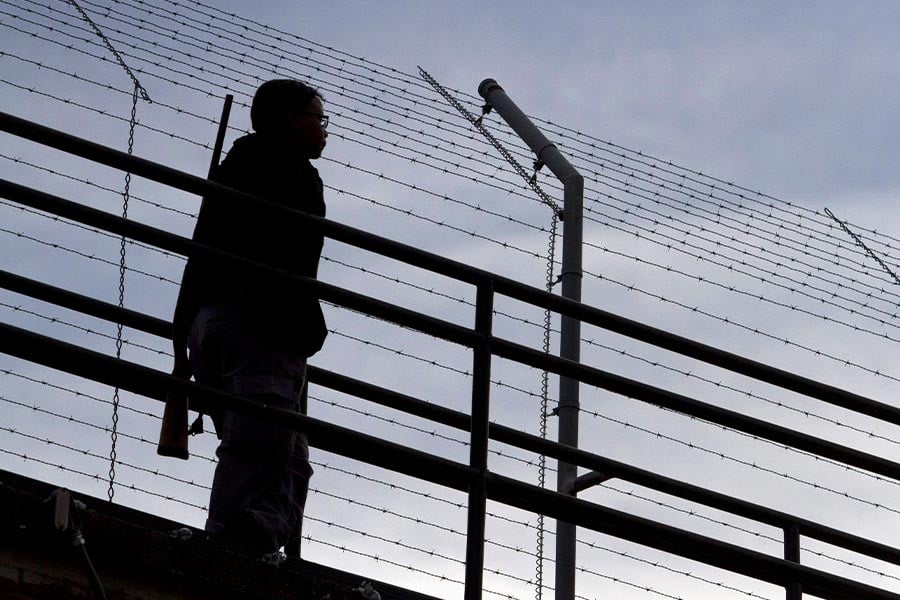Texas bishops call execution of death-row inmate an 'act of vengeance'

A prison guard stands watch in Huntsville, Texas, in this undated photo. Texas executed a 78-year-old inmate Carl Buntion by lethal injection April 21, 2022, shortly after the governor of Tennessee temporarily blocked the execution of a 72-year-old prisoner Oscar Smith, citing issues with preparations of the lethal drugs to be used. (CNS photo/Richard Carson, Reuters)
WASHINGTON (CNS) -- On April 21, Texas executed a 78-year-old inmate, Carl Buntion, by lethal injection shortly after the governor of Tennessee temporarily blocked the execution of a 72-year-old prisoner, Oscar Smith, citing issues with preparations of the lethal drugs to be used.
The Texas Conference of Catholic Bishops described Buntion's execution as "an act of vengeance and retribution, not to preserve public safety or protect the common good."
In a statement released just after Buntion's death, the bishops said that Buntion, one of the oldest death-row inmates, "was an elderly, infirm man suffering from multiple chronic health conditions and fighting pneumonia. He was of no threat to anyone."
Catholic Mobilizing Network tweeted after his death: "We pray for the repose of Carl's soul. This perverted notion of justice brings no healing and is an affront to human dignity. We must continue to fight to end the #deathpenalty."
Buntion, who was executed at the state penitentiary in Huntsville, was sentenced to death for killing a Houston police officer, James Irby, during a traffic stop in 1990.
The Supreme Court declined a request to stop his execution but in a one-paragraph statement about the court's decision, Justice Stephen Breyer reiterated his concern about the constitutionality of the death penalty especially for someone on death row for 30 years including 20 years in solitary confinement.
Breyer said Buntion's case "illustrates a serious legal and practical problem with the death penalty as it is currently administered," noting that the inmate's decades of awaiting execution raised serious questions about whether the death penalty "complies with the Constitution's prohibition against cruel and unusual punishment."
Sister Helen Prejean, a Sister of St. Joseph of Medaille and longtime advocate for the abolition of the death penalty, tweeted April 21 that Breyer "has regularly pointed out serious problems with the death penalty" and that his "principled positions and logical deconstruction of the legal morass created by the (Supreme Court) will be missed."
The Texas bishops said in their statement that they continue to pray for everyone who has been hurt by the Irby's murder, particularly his wife, Maura, and his children, Cody and Cally.
"As people of faith, we know the Easter story is about restoring right order and life triumphing over the evil of death. Killing our fellow human beings, no matter what they may have done, reduces our own humanity and capacity to love, " the bishops said.
They added that the "church expects accountability for crimes committed, legitimate discipline for the protection of society and reform of our criminal justice system so that justice and mercy may be restored."
The Associated Press reported that Buntion, while strapped to the gurney, said: "I wanted the Irby family to know one thing: I do have remorse for what I did." He then prayed Psalm 23 with his spiritual adviser before his death.
Prior to his execution, state and federal courts had turned down appeals by Buntion's attorneys to stop his death sentence. The Texas Board of Pardons and Paroles similarly rejected his clemency request.
Attorneys had argued that the jury's findings that Buntion would be a future danger to society was no longer true since he suffered from arthritis and vertigo and used a wheelchair.
Sister Prejean similarly commented on his condition in an April 19 tweet asking: "What does this execution have to do with public safety?
While Texas prison officials prepared for Buntion's execution, officials in Tennessee canceled Smith's execution scheduled for that same night.
Tennessee Gov. Bill Lee granted Smith a temporary reprieve due to an "oversight in preparation for lethal injection," which he announced just moments before the scheduled execution. The governor said in a tweet that further details would be released when available. The reprieve is effect until the beginning of June.
Following this announcement, Sister Prejean tweeted: "Why should anyone trust the government with the power to legally kill citizens after so many documented errors, failures, mistakes and, in this case, a mysterious 'oversight'?"
Smith was given the death sentence for killing his estranged wife and her two teenage sons in 1989.
Prior to the state's temporary block of his execution, the Supreme Court denied pleas for a stay. The inmate, who is Episcopalian, had just received communion from his spiritual adviser, AP reported, when he learned that his execution at the Nashville prison had been called off.
Catholic Mobilizing Network tweeted that with the execution now on hold they will continue to pray for his victims: Judy Robirds Smith and Chad and Jason Burnett, adding: "May their souls be at rest, and may their loved ones feel God's comforting presence along the journey of healing."
By Carol Zimmerman, Catholic News Service
